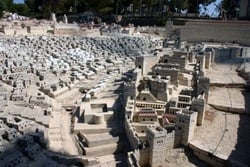 Behind the scenes two things are at work: the enemies of Paul, who think he’s dangerous to Torah observance and therefore to the sanctity of Israel and the Temple, and the friends of Paul, including family members in Jerusalem. His sister’s son somehow hears of a plot to kill Paul through the local buzz, he informs Paul, Paul passes him on to the commanding officer, and the commanding office, probably realizing how serious this situation has become, decides to escort Paul out of town and to Caesarea so he can be safely imprisoned and the trial can go on further.
Behind the scenes two things are at work: the enemies of Paul, who think he’s dangerous to Torah observance and therefore to the sanctity of Israel and the Temple, and the friends of Paul, including family members in Jerusalem. His sister’s son somehow hears of a plot to kill Paul through the local buzz, he informs Paul, Paul passes him on to the commanding officer, and the commanding office, probably realizing how serious this situation has become, decides to escort Paul out of town and to Caesarea so he can be safely imprisoned and the trial can go on further.
23:12 When morning came, the Jews formed a conspiracy and bound themselves with an oath not to eat or drink anything until they had killed Paul. 23:13 There were more than forty of them who formed this conspiracy. 23:14 They went to the chief priests and the elders and said, “We have bound ourselves with a solemn oath not to partake of anything until we have killed Paul. 23:15 So now you and the council request the commanding officer to bring him down to you, as if you were going to determine his case by conducting a more thorough inquiry. We are ready to kill him before he comes near this place.”
23:16 But when the son of Paul’s sister heard about the ambush, he came and entered the barracks and told Paul. 23:17 Paul called one of the centurions and said, “Take this young man to the commanding officer, for he has something to report to him.” 23:18 So the centurion took him and brought him to the commanding officer and said, “The prisoner Paul called me and asked me to bring this young man to you because he has something to tell you.” 23:19 The commanding officer took him by the hand, withdrew privately, and asked, “What is it that you want to report to me?” 23:20 He replied, “The Jews have agreed to ask you to bring Paul down to the council tomorrow, as if they were going to inquire more thoroughly about him. 23:21 So do not let them persuade you to do this, because more than forty of them are lying in ambush for him. They have bound themselves with an oath not to eat or drink anything until they have killed him, and now they are ready, waiting for you to agree to their request.” 23:22 Then the commanding officer sent the young man away, directing him, “Tell no one that you have reported these things to me.” 23:23 Then he summoned two of the centurions and said, “Make ready two hundred soldiers to go to Caesarea along with seventy horsemen and two hundred spearmen by nine o’clock tonight, 23:24 and provide mounts for Paul to ride so that he may be brought safely to Felix the governor.” 23:25 He wrote a letter that went like this:
23:26 Claudius Lysias to His Excellency Governor Felix, greetings. 23:27 This man was seized by the Jews and they were about to kill him, when I came up with the detachment and rescued him, because I had learned that he was a Roman citizen. 23:28 Since I wanted to know what charge they were accusing him of, I brought him down to their council. 23:29 I found he was accused with reference to controversial questions about their law, but no charge against him deserved death or imprisonment. 23:30 When I was informed there would be a plot against this man, I sent him to you at once, also ordering his accusers to state their charges against him before you.
23:31 So the soldiers, in accordance with their orders, took Paul and brought him to Antipatris during the night. 23:32 The next day they let the horsemen go on with him, and they returned to the barracks. 23:33 When the horsemen came to Caesarea and delivered the letter to the governor, they also presented Paul to him. 23:34 When the governor had read the letter, he asked what province he was from. When he learned that he was from Cilicia, 23:35 he said, “I will give you a hearing when your accusers arrive too.” Then he ordered that Paul be kept under guard in Herod’s palace.
